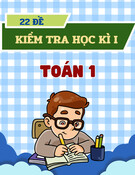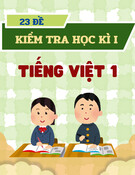
PHÒNG GD&ĐT KIM S NƠ
TR NG THCS LAI THÀNHƯỜ
Đ KI M TRA H C K IIỀ Ể Ọ Ỳ
NĂM H C 202Ọ2 - 2023
Môn: TI NG ANH 9Ế
(Th i gian làm bài 60 phút, không k giao đ)ờ ể ề
(Đ thi và h ng dề ướ ẫn ch m g m 6 trang)ấ ồ
PART A: LISTENING:
I. Listen to a radio talk about Canada. Fill each of the gaps with no more than two words. You will listen
TWICE.
CANADA
Most large cities have (1) ________________.
It is popular to see restaurants serving (2) ____________________.
Food is reasonably priced and of (3) _________________.
For shopping, there are a lot of huge (4) _______________.
Souvenirs include jewellery, (5) ____________ and maple syrup.
II. Listen to a talk between Tom and Lena about having a native-like accent. Decide if the statements are
true (T) or false (F). Circle T or F. You will listen TWICE.
6. Lena is busy because she is trying to practise pronunciation. T F
7. Tom thinks pronunciation is important in communication. T F
8. Tom thinks a foreigner shouldn’t have British accent. T F
9. People from Singapore and Malaysia also have British accent. T F
10. Tom suggests Lena should practise the language skills and learn more vocabulary. T F
PART B. LANGUAGE FOCUS:
I. Phonetics
Which word whose underlined part is pronounced differently from the others?
11. A. books B. pens C. tables D. labels
12. A. flame B. fame C. manner D. came
Choose the word whose stress pattern is differently from the others.
13. A. collection B. romantic C. medical D. domestic
II.Choose the word (A, B, C or D) that best completes the sentence.
14. Before he ……..… to bed, he……….. … a novel
A. had gone/ read B. went / read C. went / had read D. Had gone / had read

15. In the future, teachers will act more like ............... than instructors.
A. facilitators B. providers C. facilitation D. provision
16. They went to see most of the ……………places.
A.interest B. interestingly C. interested D. interesting
17. I joined an English speaking club ………. was organized by a teacher from Britain.
A. which B. that C. who D. whom
18. We all enjoyed ourselves on vacation_________the terrible weather .
A. Although B. because C. in spite of D. because of
19. He wasn’t interested in Physics, _________ ?
A. he is B. isn’t he C. was he D. he wasn’t
20. Their children have all grown ________ and left home for the city to work
A. up B. on C. to D. in
21. -"Let's meet outside the art gallery." -" "
A. Yes, let us do it. B. When can I go there?
C. I'd like to go to the concert. D. Yes. Is 8.30 all right?
22. Havy: “Sorry for being late, July”.
July: “ ”
A. I myself don’t like it. B. Never remind me
C. With all my heart D. Don’t worry about it
III. Choose the words or phrases that needs correction.
23. Hearing the news of her grandfather’s death, Susie cried hardly on my shoulder.
A B C D
24. If I am a flower, I would bea sunflower
A B C D
PART C. READING:
I. Read the passage and circle the best answer A, B or C.
Brunei is one of the smallest ( 2 5) in the world. Its population is only 25,000 and most of them live in
Bandar Seri Begawan (the capital city with the longest name in the world!) It is also the richest country in Asia
and may be the richest country in the world because it has ( 2 6) oil and natural gas which it exports to
Japan. Every week huge tankers carry oil (27) gas from the oil-fields of Brunei to Japan. The head of the
state in Brunei is Sultan Haji HassanalBolkiah. He is the richest man in the world. He has two wives and each
lives in their own beautiful palace. The first wife lives in the biggest palace in the world (28) has 200
rooms. The Sultan has(29200 cars and he also has hundreds of horses.
25. A. country B. countries C. city D. region
26. A. a few B. many C. a little D. a lot of
27. A. or B. but C. and D. because
28. A. who B. which C. when D. whom
29. A. more than B. less than C. most D. as
II. Read the following passage and mark the letter A, B, C or D to indicate the correct word or phrase
that best fits each of the numberedblanks.
Do you ever think about what schools will be like in the future? Many people think that students will study
most regular classes such as math, science and history online. Students will probably be able to learn these
subjects anywhere using a computer. What will happen if students have problem with a subject? They might
connect with a teacher through live videoconferencing. Expert teachers from learning centers will give students
help wherever they live.
Students will still take classes in a school, too. Schools will become places for learning social skills.
Teachers will guide students in learning how to work together in getting along with each other. They will help
students with group projects both in and out of the classroom. Volunteer work and working at local
businesses will teach students important life skills about the world they live in. This will help students become

an important part of their communities. Some experts say it will take five years for changes to begin in schools.
Some say it will take longer. Most people agree, though, that computers will change education the way TVs and
telephones changed life for people all over the world years before.
30. What is the best title of the passage?
A. Classes online in the future. B. Teachers help students from home in the future.
C. No schools for kids in the future. D. Education in the future.
31. The main role of teachers in the future will be .
A. helping students with group projects B. organizing live videoconferences
C. providing students with knowledge D. guiding students to learn computers
32. The word “They” in paragraph 1 refers to .
A. computers B. Students C. subjects D. teachers
33. The word “experts” in paragraph 3 has the same meaning with .
A. teachers B. specialists C. researchers D. professors
34. Who will guide students in learning how to work together in getting along with each other?
A. teachers B. computers C. schools D. volunteers
PART D. WRITING:
I.Choose the sentence that is closest in meaning to each of the sentences given
35. He always used Facebook to keep in touch with his family
A. He always used to use Facebook to keep in touch with his family.
B. He used to Facebook to keep in touch with his family.
C. He used to using Facebook to keep in touch with his family.
D. He used to use Facebook to keep in touch with his family.
36. He asked me : “Did you come by train?"
A. He asked whether I had come by train. B. He said to me if I had come by train.
C. He asked whether I come by train. D. He asks if I come by train.
37. He had done his homework before he went to bed last night.
A. He had done his homework after he went to bed last night.
B.After he went to bed last night, he had done his homework
C. After he had done his homework , he went to bed last night
D. Before he had done his homework , he went to bed last night
38. People know that cars pollute the environment.
A. People are known that cars pollute the environment.
B.It is known that cars pollute the environment.
C. It was known that cars pollute the environment.
D. Cars are known that pollutte the environment.
II.Choose the best combinations:
39. My friends are very excited. They will visit Ha Long Bay next week.
A. They will visit Ha Long Bay next week that yy friends are very excited.
B. My friends were very excited that they will visit Ha Long Bay next week.
C. My friends are very excited to will visit Ha Long Bay next week.
D. My friends are very excited that they will visit Ha Long Bay next week.
40. Paul has little money. He feels happy and enjoys his life.
A. In spite of having little money, Paul feels happy and enjoys his life.
B. Despite Paul has little money, he feels happy and enjoys his life.
C. Paul feels happy and enjoys his life even though having little money.
D. Paul feels happy and enjoys his life though in fact that having little money.
----------THE END---------

PHÒNG GD&ĐT KIM SƠN
TRƯỜNG THCS LAI THÀNH
HƯỚNG DẪN CHẤM
ĐỀ KIỂM TRA HỌC KỲ II
NĂM HỌC: 2022 -2023
MÔN TIẾNG ANH9
(Hướng dẫn chấm này gồm 03 trang)
Phần Đáp án Điểm
PART A: LISTENING:
1. a Chinatown 0,2
2. regional menus 0,2
3. . good quality 0,2
4. shopping malls 0,2
5. . crafts 0,2
6.T 0,2
7.T 0,2
8.F 0,2
9.F 0,2
10.T 0,2

PARTB:LANGUAGE
FOCUS/ PHONETIC 11.A 0,2
12.A 0,2
13.A 0,2
14.C 0,2
15.A 0,2
16.D 0,2
17.A 0,2
18.C 0,2
19.C 0,2
20.A 0,2
21.D 0,2
22.D 0,2
23.D 0,2
24.A 0,2
PART C. READING:
25.B 0,2
26.D 0,2
27.C 0,2
28.B 0,2
29.A 0,2
30.D 0,2
31.A 0,2
32.B 0,2
33.B 0,2






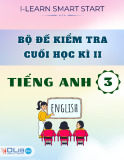
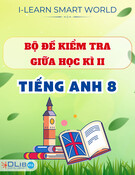
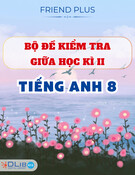
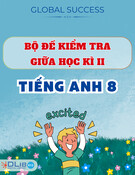
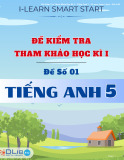

![Đề thi Tiếng Anh có đáp án [kèm lời giải chi tiết]](https://cdn.tailieu.vn/images/document/thumbnail/2025/20250810/duykpmg/135x160/64731754886819.jpg)
